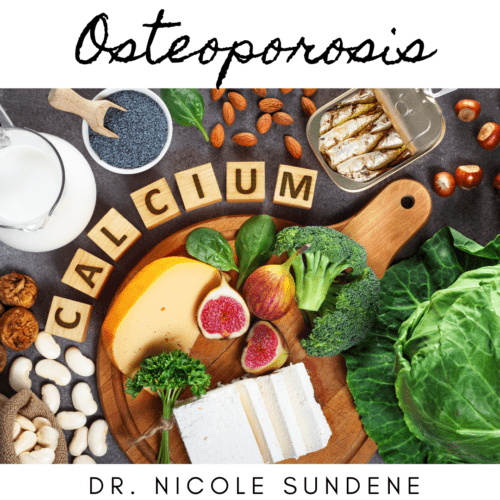
By Dr. Nicole Sundene, NMD
Osteoporosis symptoms do not occur until it is too late, therefore we will discuss very important tips today for preventing "The Silent Killer of Women." Osteoporosis is the silent killer of women because it often goes without symptoms until a patient has a bad fall or accident causing a fracture. The patient has an X-ray and their doctor says, "Wow your bones are very brittle and losing mass," and puts them on a medication for Osteoporosis such as Boniva, or another bisphosphonate medication that builds brittle bone that is more likely to fracture. Once we have found Osteoporosis it is somwhat too late and a realistic treatment goal is to prevent further progression. Occasionally I am able to reverse the Osteoporosis.
How do fractures kill women?
When a woman slips and falls and breaks a hip she is at high risk for a fat embolus coming out of the fracture site as it heals, further inactivity from fractures also further increases risk of blood clots. It is common for women to die after a bad fracture, and this can all be prevented with Naturopathy and Bio-identical Hormones.
Osteoporosis is best addressed by a Naturopathic Doctor as it is a complex nutritional issue that requires an integrated approach and a Female Hormone Specialist that can test and treat for Hormone Imbalance such as testosterone and estrogen deficiency that is common in Osteoporosis due to menopause and perimenopause.
Men don't get Osteoporosis at the same rate as women because of all the testosterone in their systems which is also bone building. Most women worry about their estrogen level but they should also be concerned about testosterone for Osteoporosis.
Osteoporosis and Osteopenia are diseases characterized by low bone mass and the deterioration of bone tissue, both mineral and nonmineral matrix, leading to enhanced bone fragility and a consequential increase in fracture risk.
In these patients, bone density has been reduced to 2.5 (or more) standard deviations below the young adult mean bone density on DEXA.
Diminished bone mass can result from a failure to reach optimal bone mass early in adulthood such as POF or "Premature Ovarian Failure," from increased bone resorption, or from decreased bone formation after peak bone mass has been achieved.
Presumably, in osteoporosis, the rate of bone formation is inadequate compared to the rate of bone resorption and so there is an inability to maintain the structural integrity of the bones.
In the United States, the estimated prevalence of osteoporosis is high, affecting 20-30 million people.
The major risk factors for osteoporosis are increased age, female gender, white or Asian race, positive family history of osteoporosis and thin body build. Other risk factors include decreased lifelong exposure to estrogen, low calcium intake (affected also by low stomach acid and Vitamin D deficiency), sedentary lifestyle (lack of weight-bearing exercise), cigarette smoking, diet, chronic alcohol and drug use.
The primary goals in the treatment and prevention of osteoporosis are to:
(1) Preserve adequate mineral mass.
(2) Prevent loss of the protein matrix and other structural bone component.
(3) Assure optimal repair mechanisms to repair damaged areas of bone.
Note: At present, there is conflicting scientific information available regarding the benefits and/or risks of soy (or other phytoestrogen-containing foods) consumption by individuals with estrogen receptor positive breast cancer lesions. In such cases, consumption of phytoestrogen-containing foods (such as soy) by these individuals is a personal decision that their Oncologist and team of physicians can guide them in making. Many herbalists believe that phytoestrogens are actually protective against estrogen dominant conditions. The decision is ultimately up to the Oncologist.
For many women I have doctored they are cleared to use phytoestrogens after cancer treatment, and sometimes even bio-identical hormones such as testosterone and DHEA. Generally their doctor does not want me to give them hormones for their menopausal hot flashes, nor do I. Thankfully I have herbs to prescribe! Some Oncologists find testosterone therapy for Osteoporosis to be perfectly acceptable and give me permission to prescribe it after cancer, but we will leave that up to the Oncologist!
In some hormone triggered cancers we cannot risk any phytoestrogens, but I always leave that decision up to the Oncologist providing the cancer care. I have provided care for women in many different situations for their menopause after cancer, and many are only allowed to use herbs such as nettles for hot flashes and night sweats.
In addition, the dietary suggestions below include foods to which some individuals may have allergies, intolerances or sensitivities and, in those cases, those foods should be avoided. Dietary choices should be modified to meet your personal dietary needs.
Women taking medications for Osteoporosis should not consume any of the herbal teas described without first consulting your Naturopathic Doctor regarding potential interactions. See your Naturoapthic Doctor for further information regarding nutrition and your individual medical condition.
Dietary Considerations
Avoid sugar, refined carbohydrates, coffee, soft drinks and alcohol.
Choose whole foods, especially organic, whenever possible. Eat a variety of them, vegetables and fruits especially, paying special attention to those foods that are high in bone-supporting nutrients: calcium, magnesium, boron and other minerals, Vitamins A, D, E and K, B vitamins, C, etc. The boron in pears, for example, helps to prevent osteoporosis. The vitamin E and calcium in almonds, also make this food a good choice.
Fresh foods are always preferable to frozen and frozen foods are always preferable to canned.
Avoid excessive intake of animal protein as well as overall protein deficiency. Daily protein goal is 0.8g/kg body weight. For instance, an average 150 pound woman should then consume 55g of protein daily. As protein deficiency is not good for the bones, nor is protein excess.
Excess protein can lead to a high metabolic production of acids that can leach minerals from the bones. Rely more on plant protein sources such as legumes, nuts and seeds, as opposed to meat, poultry, eggs and dairy products.
Use bone broth, collagen or gelatin if you do use animal protein, as collagen production is the precursor to bone formation and this helps push the pathway of bone production forward to simply throw a scoop of collagen in your smoothie every day for beautiful bones as well as beautiful hair, skin and nails!
Cold-water fish (halibut, mackerel, salmon, etc.) is still a good protein source and has other nutritional benefits, such as omega-3 essential fatty acids and Vitamin D. Tuna and Swordfish should not be consumed along with other high mercury fish as the mercury can displace calcium from the body and create a deficiency.
A diet high in vegetables and fruits favors an optimal physiological phosphorus/calcium ratio and acid/alkaline balance, is preventing the accelerated calcium loss that is observed in individuals who consume a diet high in meat, dairy products and grains.
Use organic low-fat or non-fat dairy products and dark green leafy vegetables that are high in absorbable calcium. The vegetables highest in calcium (in order of calcium content) include turnip greens, lambs quarters (herb), collard greens, rhubarb, spinach, broccoli, dandelion greens, mustard greens and kale.
Other non-dairy foods that contain significant calcium include oatmeal, fortified rice milk/soy milk/nut milk, soybeans and tofu, sesame seeds and tahini, sea vegetables, chickpeas, molasses, almonds, filberts, chestnuts, baked beans, oranges, halibut, flounder, clams, oysters, shrimp, canned sardines or salmon with bones.
Women should have three to four servings of calcium enriched nut milk, yogurt or kefir every day. Please count your calcium consumption and if you are not getting 1000mg daily you need to be taking a calcium supplement to fill in the missing milligrams.
Eat salads and dark green leafy vegetables with lemon juice or cider vinegar to help increase calcium absorption.
Some studies indicate that foods such as spinach, chard, beet greens and chocolate contain oxalates that bind with calcium, preventing its absorption.
Phytic acid found in wheat and oats will bind calcium and prevent its absorption.
Drink two to four cups daily of organic tea for trace minerals. Check out Amanda's Bone-Building Tonic Tea (recipe below).
Bone-Building Tonic Tea
Combine all herbs and make a decoction by simmering one ounce of this mixture in one quart of water, covered for 20-30 minutes. Strain and drink 2-4 cups daily.
Consult your Naturopathic Doctor for a comprehensive osteoporosis prevention or management plan that is tailored to fit your individual medical and personal needs.
Many women have digestive issues from IBS: Irritable Bowel Syndrome, heartburn, constipation, diarrhea or food sensitivities and allergies causing a malabsorption picture that should always be addressed when we are looking at miserable painful fractures tarnishing our "Golden Years."
Both of my Grandmas had terrible fractures that would not heal as they got older. This is a disease that can easily be prevented when women dedicate themselves to spreading the word on these important bone-building tips!
If you need help with your hormones, nutrition, and Osteoporosis simply pop over to my SCHEDULE page and treat yourself to a Naturopathic visit! I would be happy to help. Read more about calcium deficiency and nutrition in "Why Does My Eye Twitch?"
Dr. Nicole Sundene
(480) 837-0900
Dr. Sundene is a Naturopathic Doctor in Scottsdale, Arizona, and is a Female Hormone Expert in Women's Health and Bioidentical Hormones. She specializes in Holistic Women's Health for Menopause, Thyroid, Hashimotos, PMS, Perimenopause, Autoimmune, Postpartum Depression, Chronic Fatigue, Depression, Anxiety, Food Allergies, Digestion, Dermatology , Acne, Psoriasis, Eczema and Adrenal Hormonal Conditions. In 1999 she began working for a Hormone Doctor prior to starting Naturopathic Medical School. With over 23 years of experience in both Prescription and Natural women's health and hormones, she presents to women the best integrated health solutions for their Chronic Disease. She has been an Herbalist for over 28 years and enjoys teaching women how to use herbs to balance their hormones, nutrition and optimize their health. Dr. Sundene relies on blood testing for her hormone metrics. The hormone testing is covered per the patient's insurance plan and conducted at certain points in the woman's menstrual cycle. To learn more about Hormone Testing for Women Visit: Bioidentical Hormones. Follow Dr. Sundene on Instagram, Twitter, and Facebook for more tips on Women's Health, Female Hormones, and Naturopathy!


